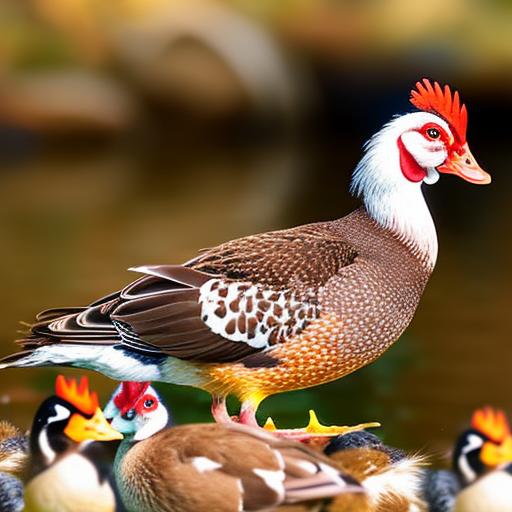Keeping chickens and ducks together in a coop can be a rewarding and beneficial arrangement for backyard flock owners. Not only do chickens and ducks provide companionship for each other, but they also offer unique benefits such as pest control and egg production. However, there are also challenges that come with keeping these two species together, such as managing their different dietary needs and waste. In this article, we will explore the benefits and challenges of keeping chickens and ducks together, as well as provide tips for setting up a coop that is suitable for both species.
Key Takeaways
- Keeping chickens and ducks together can have many benefits, including pest control and increased egg production.
- Chickens and ducks have different needs and behaviors, so it’s important to understand their differences before housing them together.
- When setting up a coop for chickens and ducks, make sure to provide enough space and separate areas for nesting and roosting.
- Feeding chickens and ducks together is possible, but it’s important to choose a balanced diet that meets the needs of both species.
- To ensure the safety and health of chickens and ducks in the coop, regular cleaning and monitoring for potential health issues is necessary.
The Benefits of Keeping Chickens and Ducks Together
One of the main benefits of keeping chickens and ducks together is pest control. Ducks are natural foragers and love to eat insects, slugs, and snails. By allowing them to roam freely in the coop, they can help keep the pest population under control. Chickens also contribute to pest control by scratching and pecking at the ground, searching for insects and larvae. This natural pest control can reduce the need for chemical pesticides in your backyard.
Another benefit of keeping chickens and ducks together is companionship. Chickens and ducks are social animals that thrive in the company of others. By providing them with a mixed flock, you are giving them the opportunity to interact and form bonds with different species. This can lead to a more harmonious and enriching environment for your birds.
Personal experiences or anecdotes can illustrate these benefits. For example, one backyard flock owner noticed a significant decrease in the slug population in their garden after introducing ducks to their chicken coop. Another owner observed that their chickens and ducks would often huddle together during cold winter nights, providing warmth and comfort to each other.
Understanding the Differences Between Chickens and Ducks
It is important to understand the key differences between chickens and ducks when keeping them together in a coop. One major difference is their diet. Chickens are primarily grain eaters and require a diet that is high in protein. Ducks, on the other hand, are omnivores and require a diet that includes both plant matter and animal protein. It is important to provide a balanced diet that meets the nutritional needs of both species.
Another difference between chickens and ducks is their behavior. Chickens are ground-dwelling birds that prefer to stay close to the coop and scratch at the ground. Ducks, on the other hand, are waterfowl that enjoy swimming and foraging in water. It is important to provide both land and water areas in the coop to accommodate the natural behaviors of both species.
Understanding these differences is crucial for successfully keeping chickens and ducks together. By providing a suitable environment and diet, you can ensure that both species thrive and coexist harmoniously.
Setting Up a Coop for Chickens and Ducks
When setting up a coop for chickens and ducks, it is important to provide adequate space and shelter for both species. Chickens require at least 4 square feet of space per bird, while ducks need at least 10 square feet per bird. This ensures that they have enough room to move around comfortably and engage in their natural behaviors.
The coop should also have separate nesting boxes for chickens and ducks. Chickens prefer nesting boxes that are elevated off the ground, while ducks prefer nesting boxes that are on the ground or near water. Providing separate nesting areas will help prevent competition and ensure that each species has a suitable place to lay their eggs.
In terms of shelter, chickens and ducks have different needs. Chickens prefer roosting bars or perches where they can sleep off the ground, while ducks prefer bedding or straw on the ground where they can nestle down. Providing both options will allow each species to choose their preferred sleeping arrangement.
Feeding Chickens and Ducks Together
Feeding chickens and ducks together can be challenging due to their different dietary needs. Chickens require a diet that is high in protein, while ducks need a balanced diet that includes both plant matter and animal protein. It is important to provide a feed that meets the nutritional needs of both species.
One option is to feed a poultry feed that is suitable for both chickens and ducks. These feeds are formulated to provide the necessary nutrients for both species. Another option is to provide separate feeds for chickens and ducks, ensuring that each species gets the appropriate nutrition.
In addition to their regular feed, chickens and ducks can also benefit from supplemental treats such as fruits, vegetables, and mealworms. These treats can be offered separately or mixed together, depending on the preferences of your birds. It is important to monitor their food intake and ensure that they are getting the nutrients they need.
Providing Water for Chickens and Ducks

Water is essential for both chickens and ducks, and it is important to provide clean and fresh water at all times. Chickens can drink from traditional waterers or nipple waterers, while ducks prefer to drink from shallow dishes or pools of water.
When providing water for ducks, it is important to consider their natural behavior of splashing and playing in water. Ducks enjoy swimming and foraging in water, so providing a small pool or shallow dish of water in the coop will allow them to engage in these behaviors.
It is important to keep their water clean and free from debris. Ducks have a tendency to dirty their water with mud and droppings, so regular cleaning and refilling of their water containers is necessary. This will help prevent the spread of bacteria and disease.
Managing the Waste of Chickens and Ducks
Managing the waste of chickens and ducks in the same coop can be challenging due to their different waste habits. Chickens produce dry droppings that are easy to manage, while ducks produce wet droppings that can be messy.
One way to manage the waste is to provide separate areas for chickens and ducks to eliminate. This can be done by using different types of bedding or by providing separate areas within the coop. Regular cleaning of the coop is also important to minimize odors and prevent the spread of bacteria.
Another option is to use deep litter bedding, which involves adding a layer of straw or wood shavings to the floor of the coop. This bedding absorbs moisture and helps control odors. It also provides a natural environment for chickens and ducks to scratch and forage.
Dealing with Potential Health Issues
When keeping chickens and ducks together, it is important to be aware of potential health issues that can arise. Chickens and ducks can both be susceptible to diseases such as respiratory infections, parasites, and fungal infections.
To prevent these health issues, it is important to provide a clean and sanitary environment for your birds. This includes regular cleaning of the coop, providing fresh water and feed, and monitoring their overall health. It is also important to quarantine any new birds before introducing them to the flock to prevent the spread of disease.
If you notice any signs of illness in your chickens or ducks, it is important to seek veterinary care immediately. Early detection and treatment can help prevent the spread of disease and ensure the health and well-being of your flock.
Ensuring Safety of Chickens and Ducks in the Coop
Ensuring the safety of chickens and ducks in the coop is crucial, especially when it comes to protecting them from predators. Chickens and ducks are both vulnerable to predators such as raccoons, foxes, and birds of prey.
To protect your flock, it is important to secure the coop with sturdy fencing or wire mesh that is buried at least 12 inches into the ground. This will prevent predators from digging under the fence and gaining access to your birds. It is also important to provide a secure roof or cover to protect your flock from birds of prey.
Regular monitoring of the coop and surrounding area is also important to identify and address any potential threats. This includes checking for signs of damage to the coop, inspecting the fencing for any gaps or holes, and removing any potential attractants such as food scraps or garbage.
Can Chickens and Ducks Coexist in a Coop?
In conclusion, keeping chickens and ducks together in a coop can be a rewarding and beneficial arrangement for backyard flock owners. The benefits of pest control and companionship make this arrangement appealing to many flock owners. However, it is important to understand the differences between chickens and ducks and provide adequate care and protection for both species.
By setting up a coop that is suitable for both chickens and ducks, providing a balanced diet, and ensuring clean water and proper waste management, you can create a harmonious environment for your mixed flock. Regular monitoring of their health and safety will help prevent potential issues and ensure the well-being of your birds.
Ultimately, whether or not chickens and ducks can coexist in a coop depends on the individual flock owner’s ability to meet their needs and provide a suitable environment. By considering the benefits and challenges outlined in this article, readers can make an informed decision about whether this arrangement is right for their own backyard flock.
If you’re considering keeping chickens and ducks together, it’s important to understand the dynamics between these two poultry species. While they can coexist harmoniously, there are certain factors to consider. One crucial aspect is the flooring of the chicken coop. A well-designed coop floor can provide a safe and comfortable environment for both chickens and ducks. To learn more about the ideal flooring options for your chicken coop, check out this informative article on Poultry Wizard: https://poultrywizard.com/keeping-chickens/floor-of-chicken-coop/. It provides valuable insights into creating a suitable living space for your feathered friends.
FAQs
Can you keep chickens and ducks together?
Yes, it is possible to keep chickens and ducks together in the same coop and run.
What are the benefits of keeping chickens and ducks together?
Keeping chickens and ducks together can provide a variety of benefits, including increased pest control, improved soil health, and a more diverse range of eggs.
What are the challenges of keeping chickens and ducks together?
One of the main challenges of keeping chickens and ducks together is that they have different dietary needs. Chickens require a higher protein diet than ducks, so it is important to ensure that both species are getting the nutrients they need. Additionally, ducks can be messier than chickens, which can lead to hygiene issues in the coop.
What should you consider before keeping chickens and ducks together?
Before keeping chickens and ducks together, it is important to consider the size of your coop and run, as well as the number of birds you plan to keep. You should also research the dietary needs of both species and ensure that you are able to provide them with appropriate food and water. Finally, you should be prepared to clean the coop and run regularly to maintain good hygiene.
Can chickens and ducks share the same water source?
Yes, chickens and ducks can share the same water source. However, it is important to ensure that the water is kept clean and free of feces and other debris to prevent the spread of disease. Providing separate water sources for each species may be a better option if you are concerned about hygiene.
Do chickens and ducks get along?
Chickens and ducks can get along, but it depends on the individual birds and their personalities. Some chickens may be aggressive towards ducks, while others may be more accepting. Similarly, some ducks may be aggressive towards chickens, while others may be more docile. It is important to monitor the birds closely and separate them if any aggression occurs.
Meet Walter, the feathered-friend fanatic of Florida! Nestled in the sunshine state, Walter struts through life with his feathered companions, clucking his way to happiness. With a coop that’s fancier than a five-star hotel, he’s the Don Juan of the chicken world. When he’s not teaching his hens to do the cha-cha, you’ll find him in a heated debate with his prized rooster, Sir Clucks-a-Lot. Walter’s poultry passion is no yolk; he’s the sunny-side-up guy you never knew you needed in your flock of friends!







